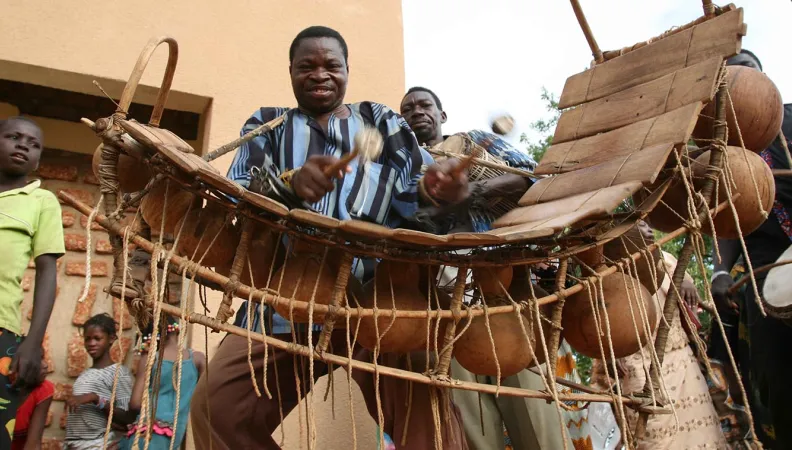Share the page
Cultural and Creative Industries for Multi-Dimensional Development
Published on

Access to culture for all is one of the priorities of AFD Group, through its support for Cultural and Creative Industries. As the Cannes Festival wraps up, how to support people working in the audiovisual sector? How to make culture a tool to strengthen social cohesion, contribute to employment and promote priority development themes, such as gender equality and education? Guillaume Langlois d'Estaintot, CCI Officer at AFD, takes a look at the Group’s latest flagship programs and projects.
What were the main developments for Culutral and Creative Industries (CCI) in AFD Group in 2021?
Guillaume Langlois d'Estaintot: With the validation of the 100% Social Link strategy in March 2021, CCI are now more than just pilot projects: they aim to infuse culture in all AFD operations led by the technical divisions and field offices. They are based on our four areas of action: infrastructure and facilities, vocational training, cultural entrepreneurship and governance.
We have started assisting our Education Division with the I-Dice (Investment in Digital Creative Enterprises) program in Nigeria, for example. It’s co-financed by African Development Bank and aims to build the skills of Nigerian youth, in particular by creating training programs in audiovisual professions, gaming, animation and other sectors.
Further reading: AFD Group's latest CCI Activity Report
What types of large projects is AFD supporting?
G.L.D: AFD allocated funds for two flagship projects in late 2021 and will be they were launched this year:
- The CCI Regional Development Project with the Indian Ocean Commission is a multi-country project worth €5.1 million. It aims to stimulate the cultural sector in the Indian Ocean region, the skills of people working in management and the artistic professions and the economic and social fabric in remote areas (such as the Comoros and Mozambique). In addition to being a cultural project, it’s also a 100% gender project, with calls for projects for women and training sessions to raise awareness of gender equality.
- The Great Zimbabwe project, with €3 million of financing, aims to promote the national cultural heritage, by developing the historical site of Great Zimbabwe. The objective is to enhance the site’s cultural and educational programming, diversify the tourist activities, and therefore attract a broader public.
Key figure: AFD Group committed €10.9 million for the promotion of CCI in 2021
The New Africa-France Summit announced a number of cultural programs last October in Montpellier.
G.L.D: Yes, there are two flagship programs in particular. Afrique Créative (Creative Africa) supports the development of creative projects through technical and financial assistance to entrepreneurs. It also ensures that their economic model is sustainable. The second edition of the program (2021-2022) has selected eight entrepreneurs in seven countries (Burkina Faso, DRC, Ghana, Morocco, Senegal, Tunisia and Uganda). In Uganda, they are training the next generation of sound engineers, and BiiBop in Burkina Faso, which creates and manufactures games and toys designed for durability and suited to the development of children, aged 0 to 6.
Accès Culture finances cultural micro-projects with strong social impacts. They focus on sustainable development themes. For example, in Tanzania, the organizers of the Time 2 Dance Festival in Dar es Salam raised awareness of deforestation through dance and theater.
With the Cannes Film Festival having just wrapped up, can you give us some examples of projects supported by AFD in the audiovisual sector?
G.L.D: The Sénégal Images project is supporting training in audiovisual professions by financing two local structures: the Yennenga Center, in partnership with CinéFabrique, for post-production, and Kourtrajmé Dakar, in partnership with the INA, for writing and audiovisual production professions. AFD is providing €1 million of financing for these two projects.
Several “edutainment” (education through entertainment) projects are also supporting social communication campaigns in Senegal. For example, the TV series “C’est la Vie!” aims to promote safer sexual behavior, while the “Wara” series stresses the importance of a more inclusive democracy for young people and women, to increase their capacity for action in civic life.
In Burkina Faso, through financing delegated by the European Union, AFD Group is supporting the audiovisual space Ciné Guimbi, which was created in 2012 by the Swiss-Burkinabe film director Berni Goldblat. It is rehabilitating the historical open-air movie theater in Bobo Dioulasso to turn it into a new screening venue, as well as a cultural hub for educational and social projects, where women and young people play an important role.
